
Journal of Petroleum Exploration and Production Technology
Scope & Guideline
Pioneering Research for Tomorrow's Energy Challenges
Introduction
Aims and Scopes
- Petroleum Engineering and Technology:
The journal covers a wide range of topics related to petroleum engineering, including drilling, completion, production, and reservoir management, focusing on technological advancements and methodologies that enhance efficiency and safety. - Geology and Geophysics:
A significant emphasis is placed on geological and geophysical studies that support exploration activities. This includes the analysis of rock properties, reservoir characterization, and the evaluation of hydrocarbon potential. - Enhanced Oil Recovery (EOR) Techniques:
The journal features research on various enhanced oil recovery methods, including chemical flooding, gas injection, and thermal techniques, aimed at improving oil recovery rates from existing reservoirs. - Machine Learning and Data Analysis:
Recent publications illustrate a growing integration of machine learning and data analytics for predictive modeling, optimization of drilling and production processes, and reservoir characterization, indicating a trend towards data-driven decision-making. - Environmental Impact and Sustainability:
There is an increasing focus on the environmental aspects of petroleum extraction, including the assessment of carbon capture, utilization, and storage (CCUS), as well as the development of eco-friendly drilling fluids and EOR agents.
Trending and Emerging
- Artificial Intelligence and Machine Learning:
There is a notable increase in the application of AI and machine learning techniques for predictive analytics, optimization, and real-time data analysis in petroleum exploration and production. - Carbon Capture and Storage (CCS):
Research focusing on carbon capture and storage technologies is on the rise, driven by global initiatives to mitigate climate change and enhance the sustainability of fossil fuel extraction. - Nanotechnology in Oil Recovery:
The application of nanomaterials and nanotechnology for enhancing oil recovery and improving drilling fluids is gaining traction, indicating a trend towards innovative solutions for traditional challenges. - Hydraulic Fracturing Innovations:
Recent publications highlight advancements in hydraulic fracturing techniques, including the use of new materials, methods for fracture optimization, and the study of fracture networks, reflecting ongoing innovation in this critical area. - Environmental and Sustainability Studies:
Research that addresses the environmental impacts of oil and gas operations, as well as the development of sustainable practices and materials, is increasingly prominent, aligning with global sustainability goals.
Declining or Waning
- Traditional Reservoir Engineering Methods:
There appears to be a decrease in research focusing solely on traditional reservoir engineering techniques, as newer, more innovative approaches are being adopted that leverage advanced technologies and data analytics. - Basic Drilling Techniques:
Research centered on conventional drilling techniques has diminished in favor of studies that explore advanced drilling technologies, automation, and the integration of machine learning for drilling optimization. - Static Analytical Models:
The reliance on static analytical models for reservoir evaluation is waning, with a noticeable shift towards dynamic modeling approaches that incorporate real-time data and machine learning for more accurate performance predictions.
Similar Journals

Petroleum Exploration and Development
Advancing the Frontiers of Petroleum SciencePetroleum Exploration and Development is a premier open-access journal published by KEAI PUBLISHING LTD, dedicated to advancing the fields of petroleum exploration and extraction as well as associated technologies. Since its inception in 2008, the journal has established itself as a key resource for researchers and professionals across various disciplines, evidenced by its impressive Q1 rankings in multiple categories including Economic Geology and Energy Engineering. With an impact factor that reflects its high citation rates and academic significance, this journal offers a unique platform for disseminating cutting-edge research related to geological studies, geochemistry, and energy sustainability. By making all its content freely accessible, Petroleum Exploration and Development ensures that its findings are available to a global audience, fostering collaboration and innovation within the community. Researchers, industry professionals, and students will find valuable insights and advancements in the realm of petroleum science, making it an essential part of their academic and professional libraries.
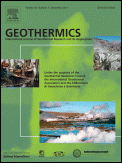
GEOTHERMICS
Unveiling cutting-edge methodologies in geothermal applications.GEOTHERMICS, published by Pergamon-Elsevier Science Ltd, serves as a leading journal in the fields of geology, geotechnical engineering, and renewable energy sustainability. With an established history dating back to 1970, this journal has evolved to become an essential platform for disseminating innovative research and applications in geothermal energy and related disciplines. Its impressive impact factor and consistent performance in prestigious quartiles—currently ranked Q1 in both Geology and Geotechnical Engineering, along with Q2 in Renewable Energy—underscore its significance in the academic community. Although this journal is not Open Access, it provides readers with valuable insights into current trends, methodologies, and technologies that drive the advancement of geothermal science. Researchers, professionals, and students alike will find GEOTHERMICS to be an invaluable resource, fostering knowledge exchange and collaboration in an increasingly important field for sustainable energy solutions.
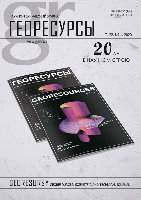
Georesursy
Unlocking the Secrets of Our Planet's ResourcesGeoresursy is a leading open access journal published by LTD GEORESURSY, serving as a vital platform for the dissemination of research in the fields of Geology and Geophysics. Operating from the Russian Federation, the journal has maintained its open access status since 2000, promoting global scholarship and accessibility to researchers, professionals, and students alike. With an ISSN of 1608-5043 and an E-ISSN of 1608-5078, Georesursy has established itself as a reputable source, currently holding a Q2 ranking in both the categories of Geology and Geophysics in 2023. This journal is indexed in Scopus, ranking #103 out of 165 and #201 out of 321 in Earth and Planetary Sciences for Geophysics and Geology, respectively. The impressive impact of the journal is underscored by its convergence years from 2017 to 2024, illustrating its commitment to advancing geological and geophysical research. We encourage contributions that reflect innovative methodologies, critical analysis, and interdisciplinary approaches essential for the progress of earth sciences.

Geophysics and Geophysical Exploration
Advancing Earth Science Through Innovative Geophysical ResearchGeophysics and Geophysical Exploration is a prestigious journal dedicated to advancing the fields of geophysics and geophysical exploration. Published by the Korean Society of Earth & Exploration Geophysicists, this journal serves as a vital platform for researchers, professionals, and students to share innovative findings and developments in geophysical methods and technologies. The journal covers a broad range of topics including but not limited to seismic analysis, subsurface modeling, and remote sensing techniques, aimed at addressing the complex challenges in Earth science exploration. Although it does not currently offer open access options, the journal maintains rigorous peer-review standards, ensuring high-quality and impactful research contributions. With its commitment to fostering knowledge exchange in the geophysical community, Geophysics and Geophysical Exploration plays a critical role in enhancing our understanding of the Earth, making it an essential resource for those interested in geoscience and related fields.
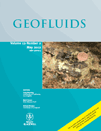
GEOFLUIDS
Exploring the Interplay of Fluids and GeologyGEOFLUIDS, published by WILEY-HINDAWI, is an esteemed open-access journal dedicated to advancing the field of Earth and Planetary Sciences since its inception in 2001. With an ISSN of 1468-8115 and E-ISSN 1468-8123, the journal has become increasingly accessible, allowing for broader dissemination of research findings since adopting an open-access model in 2017. The journal has established itself within the academic community, achieving a Scopus rank of #86 in the domain of General Earth and Planetary Sciences, placing it in the 56th percentile, and garnering a Q3 category classification as of 2023. GEOFLUIDS serves as a platform for interdisciplinary exchange of ideas and findings—encouraging contributions that explore fluid dynamics in geological systems and their implications for natural resources and environmental management. Researchers, professionals, and students alike are invited to contribute to and engage with the latest research in this growing field, further enhancing the journal's role in shaping the future of Earth science research.

Advances in Geo-Energy Research
Advancing knowledge for a greener future.Advances in Geo-Energy Research, published by Yandy Scientific Press, is a prominent, peer-reviewed journal dedicated to advancing knowledge in the fields of energy engineering, geotechnical engineering, and materials mechanics. With a robust Q1 designation in several categories, including Energy Engineering and Power Technology, Geotechnical Engineering and Engineering Geology, and Mechanics of Materials, this journal is recognized for its significant contributions to academic research and practical applications in sustainability and technological advancements. Since its transition to Open Access in 2017, it has provided researchers from around the globe with unparalleled access to cutting-edge findings, enriching the discourse in the energy domain. Based in Hong Kong, the journal continues to thrive, maintaining impressive Scopus rankings that place it in the top echelons of its field. By fostering a collaborative environment for researchers, professionals, and students, Advances in Geo-Energy Research plays an essential role in shaping the future of geo-energy technologies and their implementation.
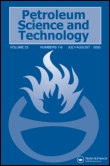
PETROLEUM SCIENCE AND TECHNOLOGY
Pioneering research in the dynamic field of petroleum science.PETROLEUM SCIENCE AND TECHNOLOGY, published by Taylor & Francis Inc, is a pivotal journal dedicated to advancing the multidisciplinary field of petroleum engineering and related technologies. With an ISSN of 1091-6466 and an E-ISSN of 1532-2459, this journal serves as a vital platform for disseminating research in areas ranging from geotechnical engineering to energy technology. As of 2023, it is recognized in the Q3 quartile across several categories, including Chemical Engineering and Fuel Technology, signifying its respectable standing within the academic community. With a convergence timeline from 1997 to 2024, the journal continuously addresses crucial issues in the energy sector, making it essential reading for researchers, industry professionals, and policy-makers alike. Although not an open access journal, its rigorous peer-reviewed articles contribute significantly to the advancement of knowledge and innovation within these fields, reflecting the journal's commitment to promoting scientific understanding and practical applications.

Petrophysics
Advancing Knowledge in Petrophysics and Engineering GeologyPetrophysics, an esteemed journal published by the Société des Pétrophysiciens et des Analysts de Forage (SPWLA), serves as a vital platform for sharing groundbreaking research in the interconnected fields of energy, geotechnical engineering, and engineering geology. With its ISSN 1529-9074, this journal has progressively established itself within the academic community, evidenced by its ranking in the Q3 category for both Energy (miscellaneous) and Geotechnical Engineering and Engineering Geology as of 2023. Researchers and professionals can contribute to and benefit from the collective insights shared within its pages, fostering advancements in petrophysics that are crucial for addressing contemporary energy challenges. While it does not currently offer open access, the journal remains pivotal in disseminating valuable findings from 2000 to 2012 and more recently from 2017 to 2023, driving innovation within a global context from its base in Houston, Texas. Engage with Petrophysics to explore and contribute to the ever-evolving landscape of energy and geotechnical research.
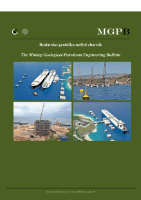
Rudarsko-Geolosko-Naftni Zbornik
Advancing Earth Sciences for a Sustainable FutureRudarsko-Geolosko-Naftni Zbornik, the esteemed journal published by the University of Zagreb's Faculty of Mining, Geology and Petroleum Engineering, serves as a vital platform for advancing knowledge in the fields of Earth sciences, energy, and geology. With an ISSN of 0353-4529 and an E-ISSN of 1849-0409, this open-access journal has been disseminating high-quality research since 1989, contributing significantly to scientific discourse in Croatia and beyond. As of 2023, it holds an impressive categorization in various quartiles, notably achieving Q2 in Earth and Planetary Sciences and Q3 in several related domains, showcasing its relevance and impact within the academic community. The journal's commitment to quality is reflected in its Scopus rankings, placing it in competitive positions across diverse disciplines. Researchers, professionals, and students alike will find invaluable resources and insights that foster innovation and collaboration in their respective fields, making Rudarsko-Geolosko-Naftni Zbornik an essential read for those dedicated to exploring the complexities of natural resources and environmental challenges.

SPE Production & Operations
Connecting Research to Real-World Energy ChallengesSPE Production & Operations is a prestigious journal published by the Society of Petroleum Engineers (SPE), focusing on the critical domains of energy engineering and fuel technology. With an ISSN of 1930-1855 and an E-ISSN of 1930-1863, this journal has established itself as a vital resource in understanding the intricacies of production and operational practices within the petroleum sector. Its impressive Q2 ranking in both Energy Engineering and Power Technology, and Fuel Technology reflects its commitment to providing high-quality, impactful research. Spanning years from 2006 to 2023, SPE Production & Operations maintains an open access policy that ensures widespread dissemination of research findings, promoting knowledge sharing among industry professionals, researchers, and students alike. As the energy landscape continues to evolve, this journal serves as an essential platform for innovative research and discussion that addresses contemporary challenges and advancements in the field.